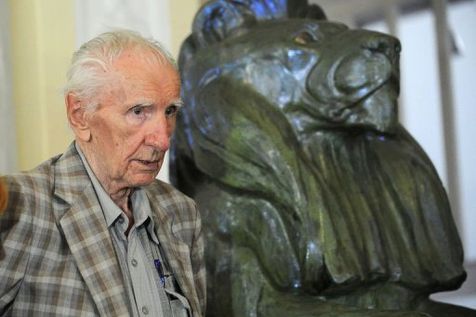Hungarian Nazi war crimes suspect Laszlo Csatary has died at the age of 98 while awaiting trial, his lawyer said.
Laszlo Csatary died in a Hungarian hospital after suffering from a number of medical problems, Gabor Horvath said.
He at one time topped the list of most wanted Nazi war crimes suspects and is alleged to have helped deport 15,700 Jews to death camps in World War II.
Laszlo Csatary faced charges relating to his wartime activities in both Hungary and in neighbouring Slovakia.
Gabor Horvath said his client died on Saturday morning.
“He had been treated for medical issues for some time but contracted pneumonia, from which he died.”

Laszlo Csatary had denied the allegations against him, saying he was merely an intermediary between Hungarian and German officials and was not involved in war crimes.
He was charged in June by Hungarian prosecutors in relation to what they said had been his role as chief of an internment camp for Jews in Kosice, a town then part of Hungary but now in Slovakia.
Kosice, known at the time as Kassa, was the first to be established after Germany occupied Hungary in March 1944.
Prosecutors said in a statement that Laszlo Csatary, a Hungarian police officer at the time, had “deliberately provided help to the unlawful executions and torture committed against Jews deported to concentration camps… from Kosice”.
Laszlo Csatary was sentenced to death in his absence in Czechoslovakia in 1948 for war crimes.
Slovakia was seeking his extradition from Hungary so it could formally sentence him although, with the abolition of the death penalty, it intended to imprison him.
The legal proceedings in Hungary were halted last month on the grounds of double jeopardy.
Laszlo Csatary was named in 2012 by the Nazi-hunting Simon Wiesenthal Center as its most wanted suspect. It claimed he oversaw the deportations of Jews from Kosice to the Auschwitz death camp.
He was tracked down in Budapest in July 2012 by reporters from the UK’s Sun newspaper, with help from the Simon Wiesenthal Center, and was put under house arrest.
Laszlo Csatary fled to Canada after the war, where he worked as an art dealer in Montreal and Toronto. He disappeared in 1997 after being stripped of his Canadian citizenship.
[youtube uOnTFG6-koc]
